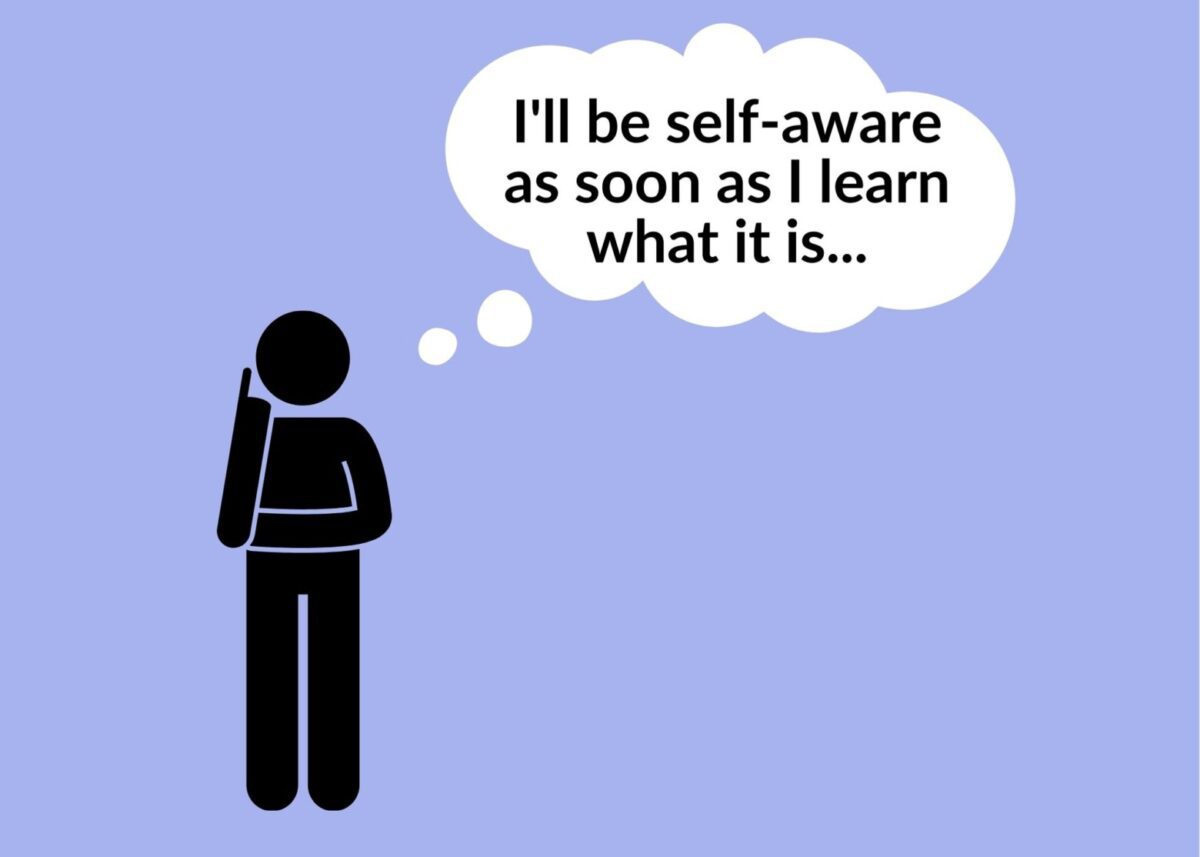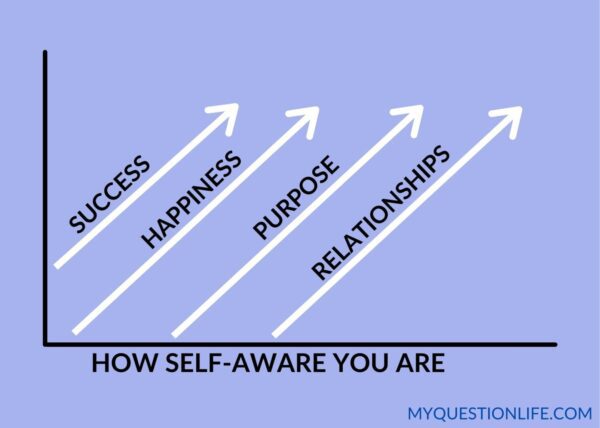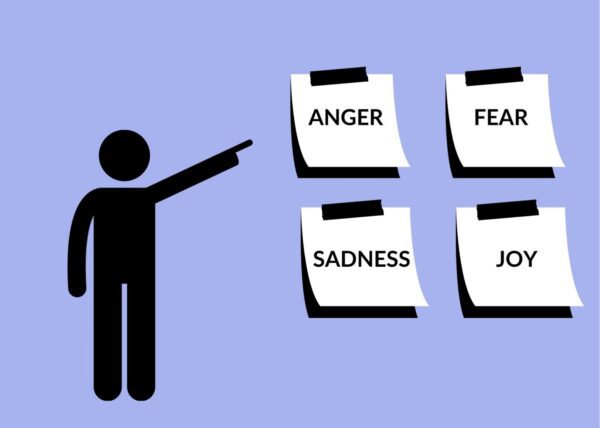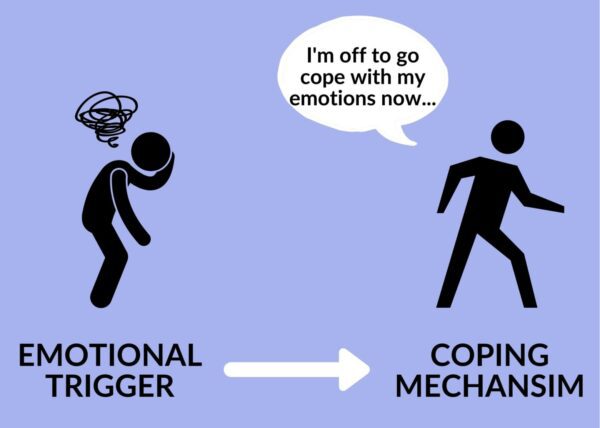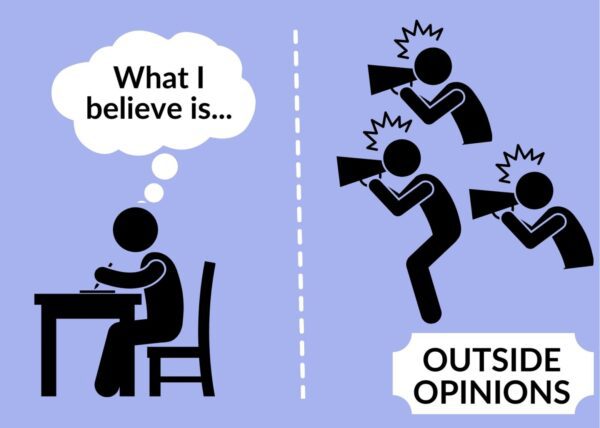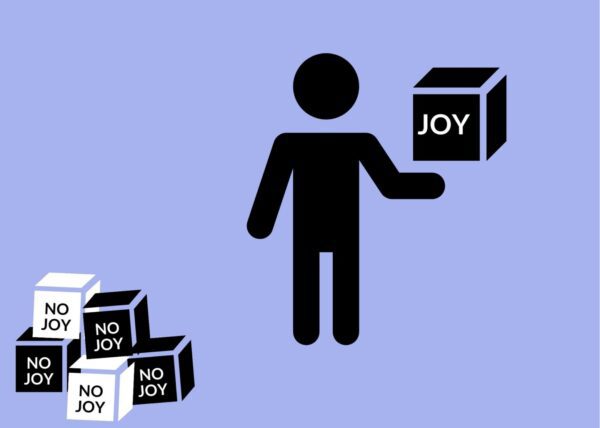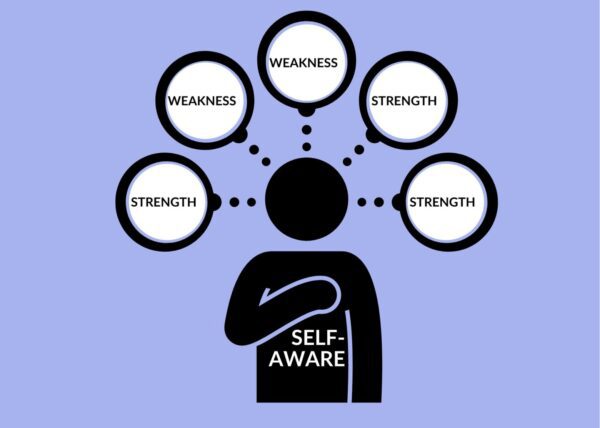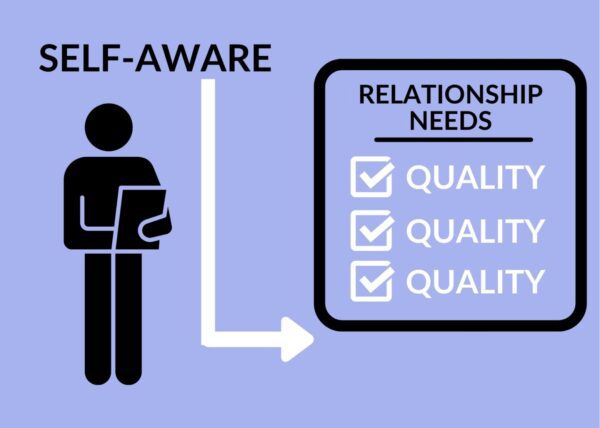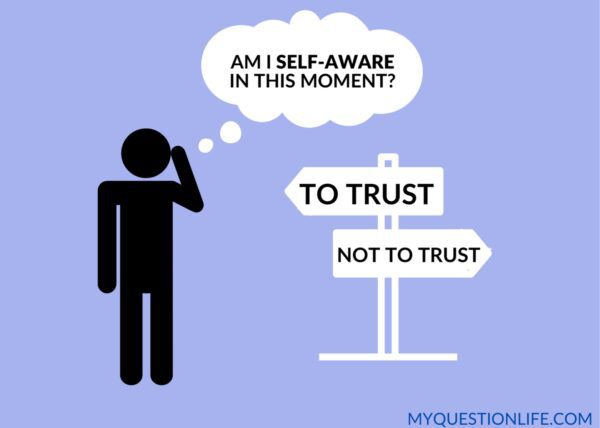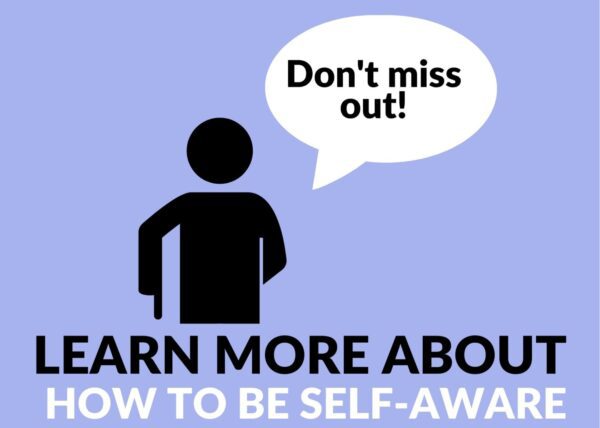If you want to know what is self-awareness (and the self-awareness definition), here are examples of self-awareness in everyday life (and why self-awareness is so important).
Self-awareness is the single most important thing in living a meaningful life. We need it to be happy, find purpose, and have healthy relationships. Incorporating self-awareness into our life is quite literally the key to living the life that we want
Just last week, one of my readers sent me an email detailing how her self-awareness journey transformed her life. She landed a new manager job, found her relationships flourishing, and elevated her self-confidence.
Being more self-aware has far-reaching effects. But very few of us know what self-awareness looks like in our lives.
Understanding what self-awareness is, how to define self-awareness, and what are examples of self-awareness in everyday life can be incredibly difficult to possess. What’s more, it can be a daunting undertaking. (Especially after I listed all of the reasons you won’t be happy without it… so like, no pressure).
One of the things holding you back from self-awareness is a lack of self-understanding. Many of us get stuck asking, “What is self-awareness?” and never really learn what it looks like.
What is Self-Awareness? Definitions of Self-Awareness
Self-awareness is our ability to notice our thoughts and feelings and how they influence our behaviors. In doing so, we can monitor ourselves because we have a better understanding of what our internal preferences are. At its core, self-awareness is our ability to understand ourselves and how we fit into the world.
Being self-aware also means recognizing what you can and can’t control. Many of us rely on the external world to tell us how to live. As a result, we take away our ability to define our own truth. We also fail to fully discover our values, dreams, and patterns – all important keys that can help inform our decision-making in creating the life we want.
If you’re looking to define self-awareness in your own words, you might say this: if you’re self-aware, you’re able to notice and name what you’re doing and feeling at any given time.
Unfortunately, self-awareness is more challenging than it sounds. (Unless it sounds challenging, in which case, you’re right on the mark.)
In fact, about 90% of people would label themselves as self-aware when only 10-15% actually are. Why the discrepancy? Our emotions, biases, and cultural messaging have a far more powerful impact than we realize. Humans are wired to lack self-awareness. Which is unfortunate – because there are so many benefits to being self-aware.
Wonder if you lack self-awareness? See if these six signs you lack self-awareness apply to your life.
.
Why is living these Examples of Self-Awareness so Important?
Self-awareness isn’t just a factor in living a happy, purposeful life. It’s essential. Studies have linked self-awareness with greater happiness, stronger relationships, better moods, and increased success, among other things.
Some of the primary benefits of self-awareness include:
- Give you a better understanding of what you want and/or need
- Increase your chances of getting what you want and/or need
- Improve your decision making
- Help you manage your emotions
- Lead to healthier reactions to external factors
- Boost your productivity and success
- Enhance your ability to make positive change
- Bolster your self-esteem
- Strengthen your relationships
Fortunately, self-awareness is a skill that we can develop – but understanding what it looks like is an important first step.
Despite how life-changing self-awareness can be, it’s not the most straightforward concept to define. And when we can’t define something, we usually have trouble pursuing it. It’s kind of like me asking you to go eat a balanced diet without giving you examples. You know you should do it, you have some specific details in mind, but you don’t know how to incorporate it regularly into your life.
By understanding examples of self-awareness in everyday life, you’ll be able to increase your self-awareness. Then, you can access its life-changing benefits.
.
[/fusion_text][fusion_code]W2ludGVyYWN0IGlkPSI2MTdmMmI2N2ViNTFhMjAwMThmMGFmNjgiIHR5cGU9InF1aXoiIG1vYmlsZT0iZmFsc2UiIG5vX2NvdmVyPSJ0cnVlIl0=[/fusion_code][fusion_text columns=”” column_min_width=”” column_spacing=”” rule_style=”default” rule_size=”” rule_color=”” content_alignment_medium=”” content_alignment_small=”” content_alignment=”” hide_on_mobile=”small-visibility,medium-visibility,large-visibility” sticky_display=”normal,sticky” class=”” id=”” font_size=”” fusion_font_family_text_font=”” fusion_font_variant_text_font=”” line_height=”” letter_spacing=”” text_color=”” animation_type=”” animation_direction=”left” animation_speed=”0.3″ animation_offset=””]
.
7 Examples of Self-Awareness in Everyday Life
1. Identifying your emotions and what you’re feeling
Perhaps the biggest obstacle to self-awareness is our emotions. When our emotions become involved, we lose our rational thinking and, instead, give way to a bunch of thoughts and defenses that skew our objective nature.
One of the examples of self-awareness is your ability to identify these emotions in the moment.
This means that, at any given moment, you can objectively name the emotion you are experiencing. While this might sound obvious, it’s actually pretty tricky. Emotions, especially when they’re negative, have a tendency to take over our body and mind without us realizing it. Picture it like putting a pair of sunglasses on. Often, you forget they’re on your face until you consciously focus on them.
When you can identify your emotions, you can begin to question what you need in that moment.
Throughout my day, I experience a range of emotions. Sometimes, when I’m feeling frustrated, I begin to get overly critical of myself and my work. In the past, I was less aware of these feelings and would fall into an unhealthy work rage. This would neither help me feel better or fix the actual problem. By improving my self-awareness, I can understand what I’m feeling and address the actual thing that made me upset in the first place.
Of all the examples of self-awareness in everyday life, checking in with your emotions is the one that you can do at any given moment of your day.
Questions:
- What emotions do you experience each day?
- How often do you listen to your body?
- What causes some of your negative emotions?
.
2. Recognizing your primary coping mechanisms
In addition to confusing emotions, we also employ a range of defensive coping mechanisms in our life. Often, we’ve developed these coping mechanisms over time. Many stem from our childhood and significant life experiences.
Being able to recognize when we get defensive and how we show it is an impactful example of self-awareness.
Let’s say Josie grew up with a family that gave her incredibly high expectations. As she maneuvered through life, she tried to find the balance between pleasing others and pleasing herself. In this journey, she began to withdraw when other people asked things of her as a defense. At times, this coping mechanism might prevent her from finding her own pride in her work.
If Josie isn’t self-aware of this coping mechanism, she’ll continue to withdraw in moments that could be positive opportunities for growth. The coping mechanism that once worked no longer serves her.
We all have our own coping mechanisms that protect us from the hurt, disappointment, and failure that we fear.
Examples of self-awareness include identifying these defenses when they’re happening, understanding the cause, and recognizing when they serve us and when they don’t.
Questions:
- What are your most common coping mechanisms?
- When do you get the most defensive in life?
- What coping mechanisms did you develop as a child that no longer serve you?
.
3. Defining your own beliefs without being influenced by others
Our society tricks us about what is meaningful in life. On top of that, our need for belonging makes us feel pressure to fit in with the people around us. As a result, we’re always getting messages about what we should believe and who we should be. Not only can this be confusing, but it can be really harmful to our own happiness.
An example of self-awareness is your ability to distinguish your own beliefs from others. You can step back and ask yourself, Am I being true to myself at this moment?
I spent much of my life feeling like I needed to fit into feminine norms. I thought that I had to care about dressing up and wearing makeup, so I dedicated hours to becoming the “ideal female.” Not only did these pursuits make me feel worse, but they took me away from the things I actually cared about.
By being self-aware about what I think is important, I can shape my life around the things that will make me happy.
It’s incredibly difficult to ignore all of the outside messages about what we should believe. However, the more you can improve your self-awareness and determine your own core values, the more you can create the life you want.
Questions:
- What are your core values?
- When have you got caught up trying to please others?
- When have you based your decision more on other people’s expectations than your own?.
.
4. Prioritizing what gives you joy and purpose
I’m sure most of you have seen the quotes that scream, “Choose joy!” If you’re like me, you might think, That’s great, I’d love to… if only I knew what choosing joy looks like.
Self-awareness can help you identify what gives you joy in life and then prioritize it.
This example of self-awareness is relatively straightforward, yet many of us fail to take the time to ask ourselves the question: What gives me joy, and when do I prioritize it in my life? Often, we might know what makes us happy, but we convince ourselves that other things are more important.
Our culture is set up in a way that makes us prioritize a lot of stuff before happiness.
The discipline to commit to what makes you happy is not always easy. For this reason, possessing the self-awareness to realize what gives you joy is the first step.
Questions:
- What gives you joy and purpose?
- How often do you prioritize joy in your everyday life?
- What do you put above your joy, and why?
.
5. Identifying your strengths and shortcomings
Sometimes we avoid self-awareness because we mistakenly associate it with not being good enough. It feels intimidating to look inward because we’re afraid of what we’re going to find.
Self-awareness examples encompass both our shortcomings and our strengths. By refusing to acknowledge the bad, we also fail to recognize the positives.
No person is perfect (despite what some of us might be conditioned to believe). Even the most successful person you know has a list of shortcomings that they had to overcome to achieve their success. It’s not about having no weaknesses.
Self-awareness is about identifying your strengths and weaknesses and finding a way to highlight your strengths.
By possessing this self-awareness, you can begin to create your life more productively. You can find strategies and support for your weaknesses, while simultaneously letting your strengths flourish.
Questions:
- What are your strengths?
- What are your weaknesses?
- How can you redesign your life or environment to emphasize your strengths?
.
6. Knowing what you need in your relationships
When we think of relationships, our mind immediately goes to two people. This “together” perspective, however, neglects both parties as individuals. In doing so, we severely limit the potential for healthy, empowering relationships.
One of our examples of self-awareness is to know what you need in your relationships.
This might sound overly simple, but it can actually be quite complicated. As we’ve established, self-awareness is extremely difficult. Many of us struggle to identify our own needs and desires. (Heck, I spend thirty minutes choosing what to eat for dinner). Because we don’t have a clear understanding of what we need in our relationships, we end up in frustrating and unfulfilling situations.
Self-awareness will help you identify what you need from other people in your life, both in general and in specific moments.
Imagine if you knew exactly what you wanted from a friend, partner, or family member. Or perhaps if you could know and communicate what you need from these relationships when you’re struggling, lost, or sad.
Questions:
- What do you value most in a friendship?
- What qualities do you need in a romantic partner?
- How often are you able to express what you need from the people in your life?
.
7. Recognize when and how to trust yourself
We often think of the word “trust” in the context of other people, but rarely do we acknowledge its importance when looking at ourselves. By now you understand how challenging it is to be self-aware. It’s also difficult to feel like we’re good enough. Add these things together, and many of us don’t trust ourselves to make the right decision.
Our last example of self-awareness is learning when you can trust yourself, and then developing this trust.
Biases and emotions will get in the way of your behaviors and thoughts. Negativity might sneak in. When you develop everyday self-awareness, you’ll recognize when this is happening. As a result, you can learn when you can trust yourself, and when you shouldn’t listen to the anxieties that are holding you back.
Questions:
- What are the things you can trust most about yourself?
- When do your emotions get in the way of your decision-making?
- How can you build your confidence in yourself?
.
Developing these Examples of Self-Awareness: How to Be More Self-Aware
Hopefully, by this point, you have a better understanding of what self-awareness should look like in your everyday life. You also might be able to recognize areas where you could be more self-aware. After all, you need self-awareness to find meaning in life.
So how do you develop these self-awareness skills?
Unfortunately, you can’t just flip a switch and become self-aware. It takes time, attention, and practice. However, the more you pause and think about what you feel, want, and need, the more you can experience the life-changing benefits of self-awareness. You can work to cultivate mindfulness habits as an individual or as a family. I’ve also laid out steps for you to become more self-aware.
.
Step One: Assess your self-awareness examples
- How Self-Aware Are You? About 90% of us think we’re self-aware when in reality, only 5-10% actually are. Take my free self-awareness test to see how you score.
Step Two: Learn more about examples of self-awareness and the myths that might be holding you back
- Why Self-Awareness Is Important: Recognize What You Can Control
- How to Be True to Yourself: The Hidden Truth We Need to Embrace
Step Three: Take steps to become more self-aware
- 9 Simple ways to Be More Self-Aware
- How to Find Direction in Life When You Don’t Have One
- 20 Self-Awareness Activities for Emotional Intelligence
Step Four: Download my free eBook The Art of Being Self-Aware
- Don’t just think about becoming more self-aware – commit to it! Check out my complete guide on self-awareness and how to be self-aware. The best part? It’s completely free. All you need to do is subscribe below.
.
Conclusion: Examples of Self-Awareness
Self-awareness is often talked about, but it can still be confusing to understand how it should manifest in your everyday life. The sooner you realize what examples of self-awareness there can be, the sooner you can implement them in your own life.
Here are seven of the most common examples of self-awareness in everyday life:
- You can identify your emotions and what you’re feeling
- You can recognize your primary defensive coping mechanisms
- You can define your own beliefs without being influenced by others
- You can prioritize what gives you joy
- You can identify your strengths and shortcomings
- You can know what you need in your relationships
- You can recognize when and how to trust yourself
Want to take the first step at developing your self-awareness? Post a comment in the section below.
Also, check out “10 Examples of Self-Awareness” from The Self-Awareness Guy to learn more about what self-awareness can look in your life, along with a number of resources to help you develop your self-awareness.
.


